The Covid-19 crisis has changed how businesses operate in a myriad of ways at an unprecedented speed. Because of lockdowns, supply chain disruptions and the need to protect public health, a variety of industries and institutions have come up with new ways of doing things and new tools with which to do them. This movement has produced a number of examples of hardware adapting to the Covid-19 challenge.
The first hurdle faced at the outset of the coronavirus pandemic was the need to work and learn remotely, with the closure of offices and schools. With all but essential business locked down, companies and institutions quickly pivoted to the digital realm, with many apps evolving during coronavirus to meet the needs of people learning and working from home.

According to McKinsey Digital consulting, the data indicates that we have advanced five years forward in consumer and business digital adoption in about an eight-week timeframe. For example, banks have transitioned to remote sales and service, grocery stores have moved to online ordering and delivery and doctors now use telemedicine, during which they can examine patients in a different location in real time.
But, according to McKinsey, it’s not only about moving to the digital realm. Companies must also “reimagine customer journeys” to make things easier for stakeholders, accelerate the shift to digital channels and provide methods to do things safely. Once restrictions started being lifted in phases, it became clear that face masks alone were not enough to make customers feel safe as they ventured out again. Hence the increased focus on hardware solutions to safety and supply chain issues.
A new signature pad with antimicrobial properties is just one example of how hardware is evolving due to Covid-19 as a way to meet new customer needs. The company Topaz Systems Inc. has introduced this new signature pad that features both an antimicrobial Signature Pad Surface and an antimicrobial Pen and Grip. This product, the WOWPad ™, includes a replaceable cable providing durability for heavy usage. The invention of this product was obviously inspired by customers’ desire to not come in contact with the pathogen left on surfaces previously touched by someone else to avoid catching coronavirus.
ScrapWare Corp. of Rockville, MD, utilizes signature pads as part of its software solution to the scrap metal recycling industry. ScrapWare can now make these signature pads available to its customers. The signature capture pad is used as part of anti-theft compliance measures. The pads permanently link signatures with a purchase ticket and reproduce the data for any ticket requested by the police.
Along these same lines, but on a bigger scale, another hardware innovation is the use of drones to provide modern sanitary solutions. New drone technologies are now being used in athletic facilities and football stadiums to clean and sanitize a facility without any human contact. This technology vaulted forward due to the demand for thorough contactless cleaning and sanitation.
A leap in hardware advances has been enabled by the “open source” hardware movement. This movement advocates for the right to repair, alter and fully own your technology, so that you can remix and reproduce gadgets with innovation. Today, the open source movement is providing some answers to the challenges presented by Covid-19. Hardware developers around the world are working to resolve supply chain problems posed by the pandemic. Some innovative solutions that have resulted include things like using 3D printers to create replacement parts or to manufacture safety equipment. For instance, 3D printers have been used to make face shields or 3D printed hands-free door openers. These are just a few examples of solving problems and replacing parts with innovative methods that will help save lives or help businesses cope during times of uncertainty.
As businesses and communities continue to adapt to the Covid-19 pandemic, expect more innovation in hardware and other tools allowing businesses to operate and protect public health at the same time.
ScrapWare Corp., of Rockville, MD, has been providing software to the scrap metal recycling industry for over 30 years. ScrapWare uses an Oracle database to provide a cloud-based software solution to manage all aspects of a recycling business. With numerous modules, extensive technical support, remote installation and online training, ScrapWare helps recycling companies with compliance, efficiency and profitability. Check out ScrapWare’s website, read the user testimonials, and see its offerings for your recycling software solution.
